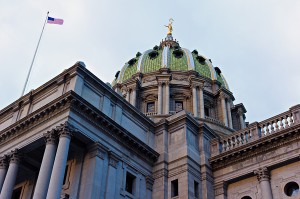Week in review: Backroom meetings and stalled reform in PA

By PA Independent Staff
Pennsylvania’s Capitol has finally settled down after a rocky budget season that saw Gov. Tom Corbett sign a $29 billion spending plan 10 days late — but not without axing more than $72 million in legislative funding and earmarks.
Since then, Corbett has hit the road to sell pension reform to residents across the state in an attempt to force lawmakers to act on the issue.
This week, we took a look back at some of the reasons pension reform and other conservative proposals have stalled and pointed out the transparency problems that accompanied some of the key budget meetings this year. And we examined what prompted Philadelphia Mayor Michael Nutter to utter the phrase “vortex of political hell.”
LOOKING BACK: Pennsylvania Gov. Tom Corbett is still pushing pension reform, but GOP lawmakers have struggled to advance a conservative agenda.
Here’s a look back at the week’s coverage:
Key budget meetings cramped, crowded and hot
The state budget is by far the most important task lawmakers take up each year, but there are plenty of cases in which people can’t see the action.
GOP lawmakers in charge routinely hosted key budget meetings in hot, cramped rooms that couldn’t accommodate all those interested in watching. While crowds of observers and lobbyists were left in the hallway, craning to hear the action inside, those lucky enough to find a spot sweated it out or battled claustrophobia.
With no cameras in some of the rooms, people couldn’t watch at home on TV or online.
House Democrats raised complaints, saying the meetings posed safety hazards and could be a violation of the state’s open-meetings law.
Melissa Melewsky, an attorney with the Pennsylvania NewsMedia Association, wouldn’t go so far as to say the General Assembly’s committee meetings violated the Sunshine Act. But, she said, lawmakers should be “as open and accommodating as possible,” especially when considering issues that generate as much interest as the state budget.
While the law might not be interpreted to say that crowded meetings should be shut down and moved to larger rooms, maybe the Legislature should do that when possible, Melewsky said.
“As much public access as possible is ideal, whether that’s through a bigger room or televised access or both,” Melewsky said. “The important thing is that anyone who’s interested needs to have a method of access to that decision because once it’s over, it’s over, and the public has lost the opportunity to see what’s going on.”
Lyft, Uber defy shut-down order
Ride-sharing services like Lyft and Uber have planted their flag in Pennsylvania, and they don’t seem apt to leave anytime soon — not even with state regulators clamping down on their operations.
The two tech-savvy companies have filled a void in Pittsburgh, where residents have complained about taxis that are either tardy or don’t arrive at all. The problem is, Lyft and Uber aren’t licensed with the Public Utility Commission, a requirement for anybody who provides transportation without compensation.
That led to a July 1 cease-and-desist order, which Lyft and Uber have simply ignored even with the prospect of $1,000 daily fines.
State Sen. Wayne Fontana, D-Allegheny, wants the companies to stay. He’s introduced legislation that would allow them to operate with regulation, but isn’t sure his bill will clear the General Assembly during this fall’s shortened session.
“It’s obvious that the public wants it and wants that competition,” Fontana said of Lyft and Uber. “Obviously, there was a gap in services that these services filled and will continue to fill.”
‘Vortex of political hell’ captures Philly’s cigarette tax bill
Philadelphia Mayor Michael Nutter gets credit for calling it like he sees it.
An obviously frustrated Nutter told reporters last week he was tired of watching the legislative ping-pong over a bill that would increase taxes on cigarettes in Philadelphia to fund schools.
“We’re caught in a vortex of political hell,” Nutter said, according to multiple news outlets.
The bill — which began life as a simple attempt at “clarifying language relating to the formation of a Government Study Referendum and Commission on consolidation/merger of municipalities” — has been loaded up with amendments. And each time a chamber makes a change, the new version has to be passed by both chambers of the General Assembly.
The state House will “most likely” consider the bill again when it returns to session Aug. 4, according to Steve Miskin, spokesman for House Majority Leader Mike Turzai, R-Allegheny.
It’s not exactly the School House Rock version of how legislation gets written and passed. But in Harrisburg it’s how things get done – eventually.
Even with GOP majority, PA lawmakers struggle to advance conservative agenda
Corbett wants pension reform, and he’s traveling the state to make his case to taxpayers.
Lawmakers haven’t been quick to meet Corbett’s demands on that front, nor have they accomplished other conservative agenda items, such as paycheck protection or liquor privatization. That’s prompted at least one lawmaker to wonder why a GOP majority can’t get more done?
In recent weeks, the focus of that question has shifted to the General Assembly’s less-conservative Republican lawmakers — many of them from southeastern Pennsylvania — and the labor unions who back them. Together they’ve formed a virtual political blockade for issues near and dear to conservatives, such as paycheck protection liquor privatization and pension reform.
The spotlight on some Republicans lawmakers and their union support only grew after the Pennsylvania AFL-CIO, the largest labor organization in the state, endorsed several GOP legislators last week.







